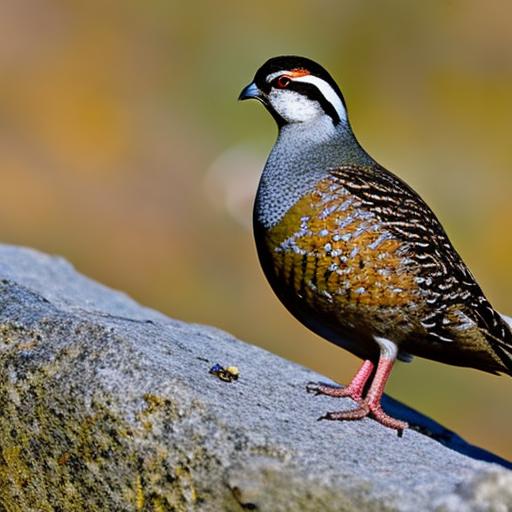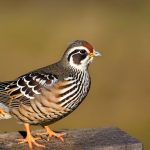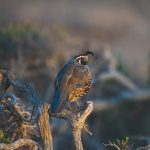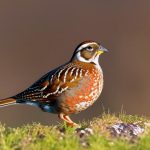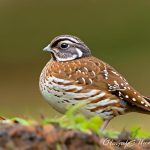Mountain quail, also known as Oreortyx pictus, are a species of bird native to the mountainous regions of western North America. They are known for their striking appearance, with a unique combination of blue, brown, and white feathers. Mountain quail are ground-dwelling birds that prefer dense brush and forested areas, making them well-suited to the rugged terrain of their natural habitat. These birds are popular among aviculture enthusiasts for their beauty and unique behaviors, making them a sought-after species for keeping in captivity.
In the state of Georgia, mountain quail are considered a non-native species, and as such, there are specific legal requirements for keeping them in captivity. These requirements are in place to ensure the welfare of the birds and to prevent the potential negative impact on the local ecosystem. Anyone interested in keeping mountain quail in Georgia must adhere to these legal requirements and obtain the necessary permits before acquiring and housing these birds.
Key Takeaways
- Mountain quail are a unique and beautiful species of bird native to the western United States.
- In Georgia, it is illegal to keep mountain quail without a permit from the Department of Natural Resources.
- To obtain a permit for keeping mountain quail in Georgia, individuals must submit an application and meet specific requirements.
- Proper housing and care for mountain quail include providing adequate space, shelter, and a balanced diet.
- Owners of mountain quail are responsible for ensuring the birds’ welfare and complying with all permit regulations.
- Keeping mountain quail without a permit in Georgia can result in fines, confiscation of the birds, and legal consequences.
- For more information on keeping mountain quail in Georgia, individuals can contact the Department of Natural Resources or visit their website.
Legal Requirements for Keeping Mountain Quail in Georgia
In Georgia, the keeping of non-native wildlife species, including mountain quail, is regulated by the Georgia Department of Natural Resources (DNR). The DNR has established specific rules and regulations for the possession and care of non-native wildlife, including the mountain quail. These regulations are designed to protect both the welfare of the animals and the integrity of the local ecosystem.
To legally keep mountain quail in Georgia, individuals must obtain a permit from the DNR. The permit application process involves demonstrating an understanding of the specific care requirements for mountain quail and providing details about the intended housing and care arrangements for the birds. Additionally, individuals must adhere to strict guidelines regarding the sourcing of mountain quail, as it is illegal to capture these birds from the wild for the purpose of keeping them in captivity. Instead, individuals must acquire mountain quail from reputable breeders or other legal sources.
Application Process for Obtaining a Permit
The application process for obtaining a permit to keep mountain quail in Georgia involves several steps. First, individuals must familiarize themselves with the specific regulations outlined by the Georgia DNR regarding the possession and care of non-native wildlife. This includes understanding the housing and care requirements for mountain quail, as well as the legal obligations of owning these birds.
Once individuals have a thorough understanding of the legal requirements, they can proceed with the permit application process. This typically involves completing a detailed application form provided by the DNR, which requires information about the applicant’s experience with aviculture, their intended housing and care arrangements for the mountain quail, and their plans for sourcing the birds from legal and ethical sources.
After submitting the permit application, individuals may be subject to an inspection of their proposed housing facilities to ensure that they meet the specific requirements for keeping mountain quail. This may include providing evidence of appropriate enclosures, feeding arrangements, and veterinary care plans for the birds. Once the DNR has reviewed the application and conducted any necessary inspections, they will issue a permit if they are satisfied that the applicant can meet all legal requirements for keeping mountain quail in Georgia.
Housing and Care Requirements for Mountain Quail
Mountain quail have specific housing and care requirements that must be met in order to ensure their health and well-being in captivity. These birds require spacious enclosures with plenty of natural vegetation and cover to mimic their natural habitat. The enclosure should also provide protection from predators and inclement weather while allowing the birds to exhibit natural behaviors such as foraging, dust bathing, and nesting.
In addition to appropriate housing, mountain quail require a specialized diet that includes a variety of seeds, insects, and vegetation. It is important for owners to provide a balanced diet that meets the nutritional needs of these birds to ensure their long-term health. Furthermore, regular veterinary care is essential to monitor the health of mountain quail and address any potential medical issues that may arise.
Owners of mountain quail must also consider the social needs of these birds, as they are known to thrive in small flocks. Providing opportunities for social interaction and enrichment activities is crucial for the well-being of captive mountain quail. Additionally, owners must be prepared to handle breeding behaviors if they intend to keep male and female birds together, as this may result in offspring that will require appropriate care and housing.
Responsibilities of Mountain Quail Owners
Owners of mountain quail in Georgia have a range of responsibilities to ensure the welfare of their birds and compliance with legal requirements. These responsibilities include providing appropriate housing, nutrition, and veterinary care for the birds, as well as maintaining accurate records of their acquisition and care. Owners must also stay informed about any changes to regulations regarding the possession and care of non-native wildlife in Georgia to ensure ongoing compliance.
Furthermore, owners are responsible for preventing the escape or release of mountain quail into the wild, as this could have detrimental effects on local ecosystems. It is essential for owners to take all necessary precautions to prevent accidental escapes and to report any lost or stolen birds to the appropriate authorities.
Owners of mountain quail should also be prepared to invest time and resources into providing enrichment activities for their birds to support their physical and psychological well-being. This may include providing opportunities for natural behaviors such as foraging, dust bathing, and social interaction within a safe and secure environment.
Consequences of Keeping Mountain Quail Without a Permit

The consequences of keeping mountain quail in Georgia without a permit can be severe. Individuals found to be in possession of mountain quail without the necessary permits may face legal repercussions, including fines, confiscation of the birds, and potential restrictions on future ownership of non-native wildlife. Additionally, keeping mountain quail without a permit can have negative implications for both the welfare of the birds and the local ecosystem.
Without proper oversight from regulatory authorities, there is a risk that mountain quail may be subjected to inadequate care or inappropriate housing conditions if kept without a permit. This can lead to negative impacts on the health and well-being of the birds, as well as potential risks to public health and safety if escaped or released into the wild.
From an ecological perspective, unauthorized possession of mountain quail poses a risk of introducing non-native species into local ecosystems, which can have detrimental effects on native wildlife populations and habitats. Therefore, it is crucial for individuals interested in keeping mountain quail in Georgia to adhere to legal requirements and obtain the necessary permits to ensure responsible ownership and protection of both the birds and the environment.
Resources for More Information on Keeping Mountain Quail in Georgia
For individuals seeking more information on keeping mountain quail in Georgia, there are several resources available to provide guidance on legal requirements, care recommendations, and responsible ownership practices. The Georgia Department of Natural Resources (DNR) website is a valuable source of information regarding regulations for possessing non-native wildlife species, including mountain quail. The DNR website provides access to permit application forms, detailed guidelines for housing and care requirements, and contact information for inquiries related to keeping non-native wildlife in Georgia.
In addition to official government resources, avicultural organizations and forums can be valuable sources of information and support for individuals interested in keeping mountain quail. These organizations often provide educational materials, networking opportunities with experienced aviculturists, and access to reputable breeders or sellers of mountain quail.
Furthermore, seeking guidance from experienced aviculturists or wildlife rehabilitators who have expertise in caring for mountain quail can provide valuable insights into best practices for housing, nutrition, and enrichment activities for these birds. By leveraging these resources, individuals can ensure that they are well-informed about legal requirements and equipped with the knowledge and support necessary to provide responsible care for mountain quail in Georgia.
In conclusion, keeping mountain quail in Georgia requires adherence to specific legal requirements established by the Georgia Department of Natural Resources (DNR). Individuals interested in owning these birds must obtain a permit through a thorough application process that demonstrates an understanding of housing and care requirements as well as compliance with regulations regarding sourcing from legal sources. Responsible ownership entails meeting housing and care requirements while preventing escapes or releases into the wild. Failure to comply with legal requirements can result in severe consequences including fines and confiscation of birds. However, by accessing resources such as government websites, avicultural organizations, and experienced aviculturists, individuals can gain valuable information and support to ensure responsible ownership of mountain quail in Georgia.
If you’re considering keeping mountain quail in Georgia, you may be wondering if a permit is required. According to a helpful article on PoultryWizard.com, “Understanding the Legal Requirements for Keeping Quail in Georgia,” it’s important to be aware of the regulations and permits necessary for keeping quail in the state. This informative piece provides valuable insights into the legal aspects of keeping quail and can help you navigate the requirements with confidence. For more information on creating a suitable habitat for your quail, check out their article on Snaplock Chicken Coop and A-Frame Chicken Coop.
FAQs
Do I need a permit to keep mountain quail in Georgia?
Yes, in Georgia, a permit is required to keep mountain quail. The Georgia Department of Natural Resources regulates the possession and keeping of wildlife, including mountain quail, and a permit is necessary to legally keep them.
How do I obtain a permit to keep mountain quail in Georgia?
To obtain a permit to keep mountain quail in Georgia, you will need to contact the Georgia Department of Natural Resources. They will provide you with the necessary information and application process for obtaining a permit to keep mountain quail.
What are the regulations for keeping mountain quail in Georgia?
The regulations for keeping mountain quail in Georgia are set by the Georgia Department of Natural Resources. These regulations may include requirements for housing, care, and transportation of mountain quail, as well as restrictions on breeding and selling them.
What are the consequences of keeping mountain quail in Georgia without a permit?
Keeping mountain quail in Georgia without a permit is illegal and can result in fines, confiscation of the birds, and other legal consequences. It is important to obtain the necessary permit and comply with the regulations set by the Georgia Department of Natural Resources to avoid any legal issues.
Meet Walter, the feathered-friend fanatic of Florida! Nestled in the sunshine state, Walter struts through life with his feathered companions, clucking his way to happiness. With a coop that’s fancier than a five-star hotel, he’s the Don Juan of the chicken world. When he’s not teaching his hens to do the cha-cha, you’ll find him in a heated debate with his prized rooster, Sir Clucks-a-Lot. Walter’s poultry passion is no yolk; he’s the sunny-side-up guy you never knew you needed in your flock of friends!

